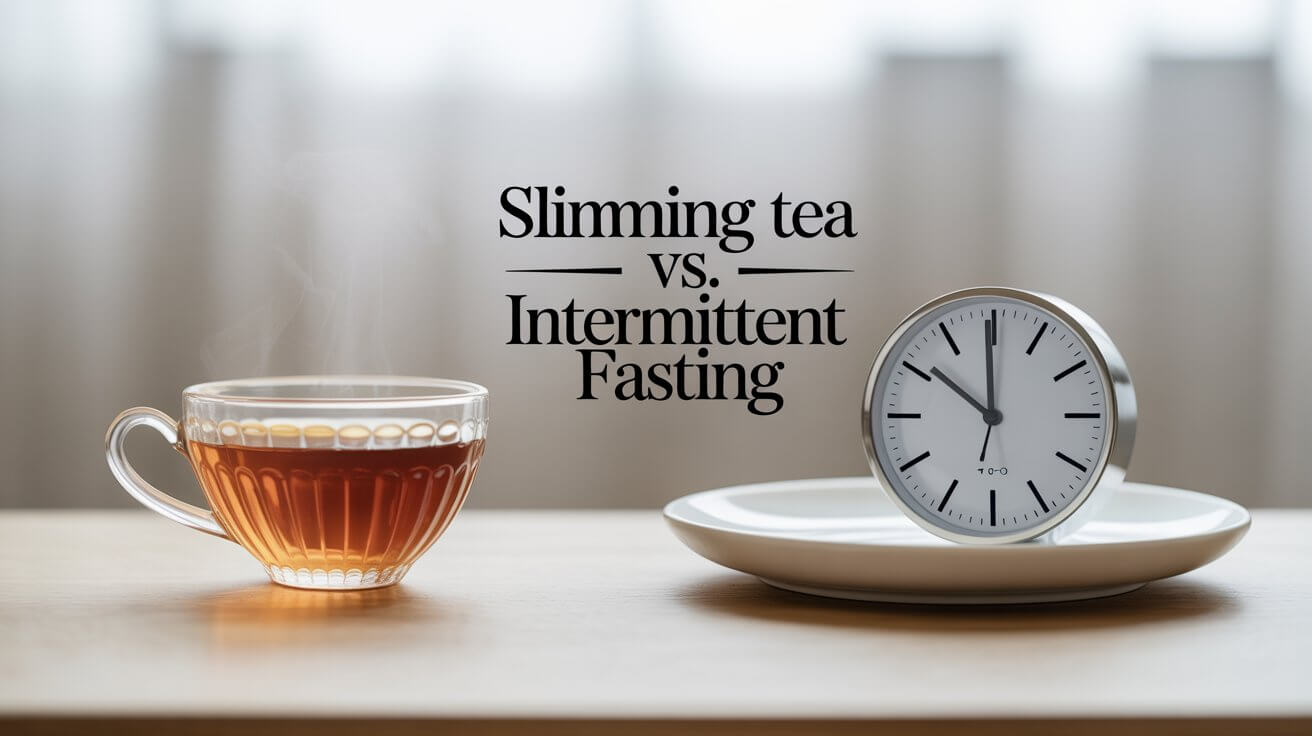When it comes to losing weight, most people are torn between two very different approaches: relying on slimming teas or committing to intermittent fasting. Both methods are widely discussed in the wellness space, yet they offer very different paths to the same goal fat loss and better health. If you’ve ever wondered whether sipping slimming tea or trying intermittent fasting is the better choice, this guide will give you a clear, balanced comparison.
What Exactly Is Slimming Tea?
Slimming tea refers to herbal blends designed to support weight management. Many formulas contain ingredients such as green tea, oolong, dandelion root, senna, and other natural extracts. The claimed benefits often include:
-
Supporting metabolism and calorie burning
-
Reducing bloating and water weight
-
Aiding digestion and gut function
-
Providing a gentle detox effect
Unlike diet pills or synthetic options, slimming tea is usually plant-based. For example, on All Day Slimming Tea, you’ll find natural blends crafted to help promote energy and digestion without harsh chemicals.
It’s important to note, however, that slimming teas often work by reducing excess water or improving digestion, rather than directly burning fat. While they can make you feel lighter and less bloated, results vary depending on diet and lifestyle.
What Is Intermittent Fasting?
Intermittent fasting (often called IF) is not about what you eat, but when you eat. Instead of spreading meals throughout the day, IF restricts eating to specific time windows. Popular approaches include:
-
16:8 method – fasting for 16 hours and eating within an 8-hour window.
-
5:2 method – eating normally 5 days a week and limiting calories on 2 days.
-
Alternate-day fasting – fasting every other day or limiting calories significantly.
Intermittent fasting has been studied for its potential to:
-
Improve insulin sensitivity
-
Support fat loss by lowering overall calorie intake
-
Boost cellular repair and longevity processes
-
Enhance mental clarity for some individuals
While research shows promise, fasting can be challenging. Hunger, fatigue, and difficulty maintaining a social eating schedule are common struggles.
Slimming Tea vs Intermittent Fasting: A Direct Comparison
1. Effectiveness for Weight Loss
-
Slimming tea can give quick relief from bloating and help digestion, which may reflect as a small drop on the scale. However, the effect is usually temporary unless paired with lifestyle changes.
-
Intermittent fasting, on the other hand, reduces calorie intake over time, which can lead to more consistent fat loss if maintained.
2. Short-Term vs Long-Term Results
-
Slimming tea is excellent for short-term benefits like feeling lighter, energized, or more comfortable in your body.
-
Intermittent fasting shows better long-term evidence for fat loss and improved health markers, provided you stick with it.
3. Health Benefits Beyond Weight Loss
-
Slimming tea: improves digestion, reduces bloating, and provides antioxidants from herbal ingredients.
-
Intermittent fasting: linked to reduced inflammation, improved heart health, and possibly longevity.
4. Risks and Side Effects
-
Slimming teas may contain laxative herbs like senna, which should not be overused. Excess consumption can lead to dehydration or dependency. Choosing high-quality blends, such as those at All Day Slimming Tea, minimizes these risks.
-
Intermittent fasting may cause hunger, irritability, or energy dips, especially when starting out. It’s not always suitable for people with certain medical conditions.
5. Cost and Accessibility
-
Slimming tea is a purchased product but often affordable and convenient you simply brew and enjoy.
-
Intermittent fasting is free, but it demands discipline and consistency, which not everyone finds easy.
Who Should Choose Which?
Slimming teas may be best for people who:
-
Want a gentle, natural aid for bloating or digestion
-
Are looking for an easy daily ritual to support wellness
-
Need a short-term boost while working on long-term changes
Intermittent fasting may be best for those who:
-
Prefer structured eating patterns instead of supplements
-
Want sustainable fat loss backed by scientific studies
-
Can handle periods of hunger without difficulty
For many, the best approach could be combining both. Drinking a natural slimming tea during fasting hours (as long as it’s calorie-free) can make the process more enjoyable, while also supporting digestion and hydration.
The Bottom Line
Slimming tea and intermittent fasting each bring unique benefits to the table. Slimming teas are easy to incorporate, refreshing, and provide quick support for digestion and bloating. Intermittent fasting, on the other hand, is a lifestyle shift that can bring long-term weight management and health benefits.
Neither is a magic bullet. The best path to sustainable results is a balanced diet, regular movement, and healthy routines. Still, if you’re curious to try slimming teas as a natural aid on your journey, explore the blends available at All Day Slimming Tea. It’s an enjoyable, simple step you can start today, without overhauling your entire routine.


Leave a Reply